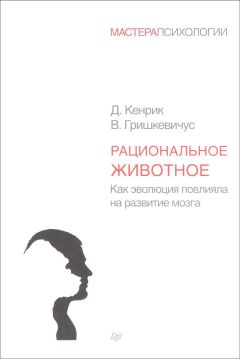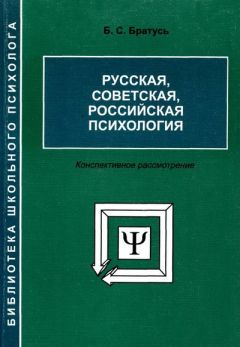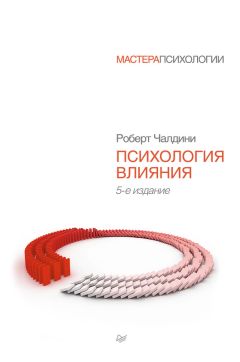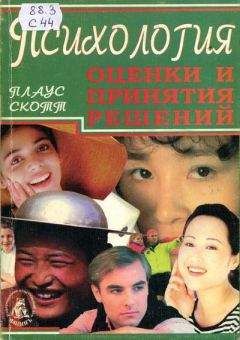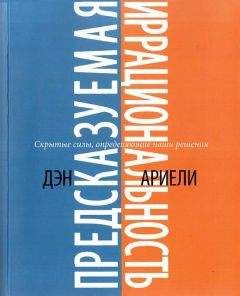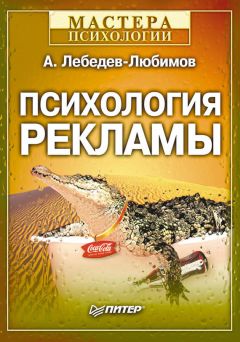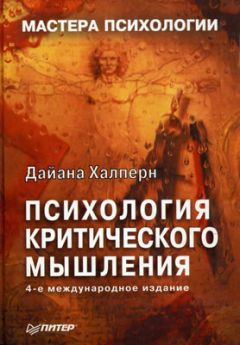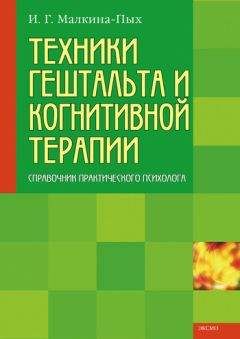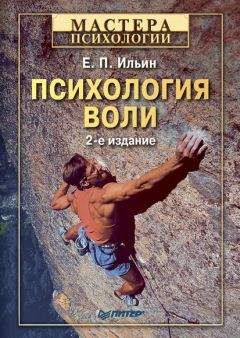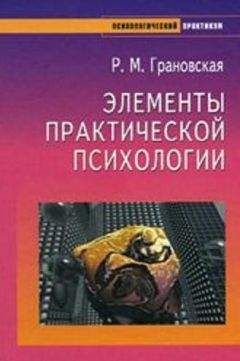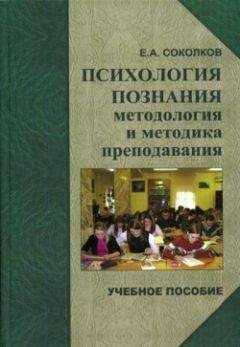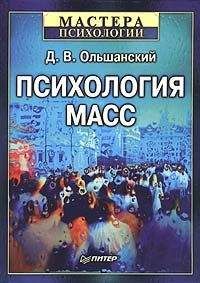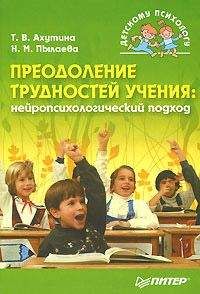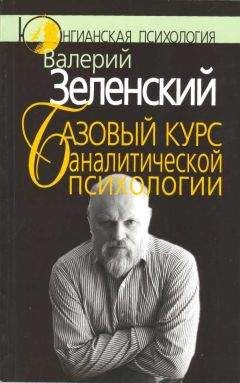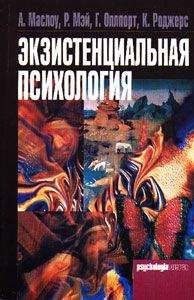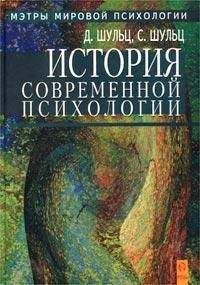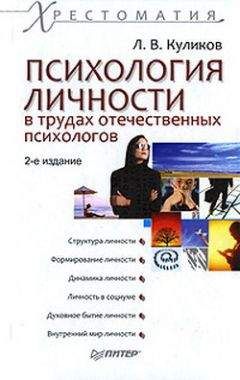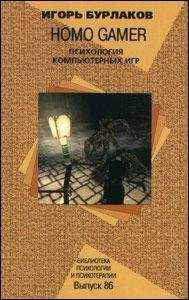Дайана Халперн - Психология критического мышления
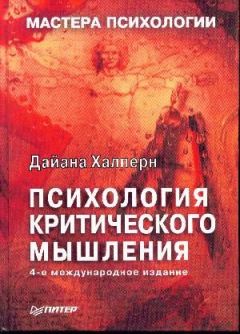
Скачивание начинается... Если скачивание не началось автоматически, пожалуйста нажмите на эту ссылку.
Жалоба
Напишите нам, и мы в срочном порядке примем меры.
Описание книги "Психология критического мышления"
Описание и краткое содержание "Психология критического мышления" читать бесплатно онлайн.
Эта книга написана в помощь тем, кто хочет научиться думать современно. Опираясь на новейшие достижения когнитивной психологии и свой уникальный педагогический опыт, Дайана Халперн разработала эффективную программу обучения навыкам «критического мышления». Данная книга может быть широко использована в преподавательской и методи-ческой работе, окажет неоценимую помощь в самообразовании, а кроме того, является свое-образным путеводителем по современной когнитивной психологии. Рекомендуется психологам, педагогам, философам, а также всем интересующимся когнитивной психологией, психологией творчества, теорией принятия решений.
Hutchings P. (1986). Some late night thoughts on teaching creativity. American Association for Higher Educawn, 39, 9-14.
Izawa С (1993). Efficient learning: The total time, exposure duration, frequency, and programming of the study phase. In С Izawa (Ed.), Cognitive psychology applied (pp. 43-78). Hillsdale, NJ: Lawrence Erlbaum Associates.
Izawa C, Hayden R. G. (1993). Race against time: Toward the principle of optimization in learning and retention. In C. Izawa (Ed.), Cognitive psychology applied (pp. 15-42). Hillsdale, NJ: Lawrence Erlbaum Associates.
Jacoby L. L., Kelley С. М., Dywan, J. (1989). Memory attributions. In H. L. Roedinger amp; F. I M. Craik (Eds.), Varietes of memory and consciousness: Essays in honor of Endel Tulving (pp. 391 -422). Hillsdale, NJ: Lawrence Erlbaum Associates.
James W. (1890). The principles of psychology New York: Holt.
Janis I. L. (1989). Crucial decisions: Leadership in policy making and crisis management. New York: The Free Press.
Janis I. L., Mann L. (1977). Decision making: A psychological analysis of conflict, choice and commitment. New York: The Free Press.
Jason G. (1987). Are fallacies common? A look at two debates. Informal Logic, 8, 81-92.
Jensen A. R. (1980). Bias in mental testing. New York: The Free Press.
Jensen A. R. (1981). Straight talk about mental tests. New York: The Free Press.
Johnson M. K., Raye C. L. (1981). Reality monitoring. Psychological Review, 88,67-85.
Johnson-Laird P. N… Byrric R. M. J. (1991). Deduction. Hillsdale, NJ: Lawrence Erlbaum Associates.
Johnson-Laird P. N… Legrenzi P., Legrenzi M. (1972). Reasoning and a sense of reality. British Journal of Psychology. 63, 395-400.
Johnson-Laird P. N., Wason P. C. (1970). A theoretical analysis of insight into a reasoning task. Cognitive Psychology, 1, 134-148.
Johnson-Laird P. N., Wason P. С (Eds). (1977). Thinking Readings in cognitive science. Cambridge, England: Cambridge University Press.
Kahane H. (1980). Logic and contemporary rhetoric: The use of reason in everyday life (2nd ed.). Bel-mont, CA: Wadsworth.
Kahane H. (1992). Logic and contemporary rhetoric: The use of reason in everyday life (6th ed.). Bel-mont, CA: Wadsworth.
Kahneman D., Tver sky A. (1973). On the psychology of prediction. Psychological Review, 80, 237-251.
Kahneman D., Tversky A. (1979). Prospect theory: An analysis of decision under risk. Econometrica, 47, 263-291.
Kamin L. J. (1974). The science and politics of IQ. New York: Wiley.
Kavanaugh D. J., Bower G. H. (1985). Mood and self-efficacy: Impact of joy and sadness on perceived capabilities. Cognitive Therapy amp; Research, 9, 507-525.
Kelley D. (1988). The art of reasoning. New York: Norton.
Kellogg R. T. (1990, Fall). Effectiveness of prewriting strategies as a function of task demands. American Journal of Psychology, pp. 327-342.
Kidd V. (1991, Fall). An analysis of the California tobacco education campaign's visual anti-smoking messages. Feedback, 32,14-18.
Kimble G. A. (1978). How to use (and misuse) statistics. Englewood Cliffs, NJ: Prentice-Hall.
King A. (1989). Effects of self-questioning training on college students' comprehension of lectures. Contemporary Educational Psychology, 14, 1-16.
King A. (1992). Facilitating elaborative learning through guided student-generated questioning. Educational Psychologist, pp. 111-126.
King A. (1994). Inquiry as a tool in critical thinking. In D. F. Halpern (Ed.), Changing college classrooms: New teaching and learning strategies in an increasingly complex world (pp. 13-38). San Francisco: Jossey-Bass.
King A. (1995). Inquiring minds really do want to know: Using questioning to teach critical thinking. In D. F. Halpern amp; S. G. Nummedal (Eds.), Psychologists teach critical thinking [Special issue]. Teaching of Psychology, 22,13-17.
Klaczynski P. A. (1993). Reasoning schema effects on adolescent rule acquisition and transfer. Journal of Educational Psychology, 85, 679-692.
Klein G. A., WeizenfeldJ. (1978). Improvement of skills for solving ill-defined problems. Educational Psychologist, 13, 31-41.
Kneller G. F. (1965). The art and science of creativity. New York: Holt, Rinehart amp; Winston.
Knight K., Dansereau D. F. (1992). Tools for drug and alcohol education: Using decision worksheets in personal problem solving. Journal of Drug Education, 22(3), 261-271.
Koestler A. (1964). The act of creation. London: Hutch-inson.
Kohl H. (1981). A book of puzzlements: Play and invention with language. New York: Schocken Books.
Kohler W. (1925). The mentality of apes. New York: Harcourt, Brace.
Kohler W. (1969). The task of Gestalt psychology. Princeton, NJ: Princeton University Press.
Koriat A., Lihtenstein S., Fischhoff B. (1980). Reasons for confidence. Journal of Experimental Psychology. Human Learning and Memory, 6,107-118.
Kruglanski A. W. (1992). On methods of good judgment and good methods of judgment: Political decisions and the art of the possible. Political Psychology, 13,455-475.
Kuhn D. (1993, January). Connecting scientific and informal reasoning. Merrill-Palmer Quarterly, pp. 74-103.
Kuhn D., Weinstock M., Flaton R. (1994). How well do jurors reason? Competence dimensions of individual variation in a juror reasoning task. Psychological Science, 5, 289-296
Kunda Z., Nisbett R. E. (1986). The psychometrics of everyday life. Cognitive Psychology, 18,195-224.
LangerE. J. (1989). Mindfulness. Reading, MA: Addison-Wesley
Langer E. (1994, July). Improving the quality of thinking in a changing world. Paper presented at the Sixth International Conference on Thinking, Cambridge, MA.
LangerE. J., Blank A., Chanowitz B. (1978). The mind-lessness of ostensibly thoughtful action: The role of «placebic» information in interpersonal interaction. Journal of Personality and Social Psychology, 36, 635-642.
Langley P., Simon H. A., Bradshaw G. L., Zytkow J. M. (1987). Scientific discovery: Computational explorations of the creative process. Cambridge. MA: "MIT Press.
LangrehrS. (1990) Sharing thinking strategies. Bloom-ington, IN: National Educational Service.
Larrick R. P., Morgan J. N… Nisbett R. E. (1990). Teaching the use of cost-benefit reasoning in everyday life. Psychological Science, 1, 362-370.
Lee A.M. (1953). How to understand propaganda. New York: Holt, Rinehart amp; Company.
Leedy P. D. (1981). How to read research and understand it. New York: Macmillan.
Lehman D. R., Lempert R. 0., Nisbett R. E. (1988). The effects of graduate training on reasoning: Formal discipline and thinking about everyday-life events. American Psychologist, pp. 431-442.
Lehman D. R., Nisbett R. E. (1990). A longitudinal study of the effects of undergraduate training on reasoning. Developmental Psychology, 26,431-442.
Leive C. (1994, April). Miss America. Glamour, pp. 234-237,275-281.
Levi D. S. (1991). Critical thinking and logic. Salem, WI: Sheffield.
Levine M. (1994). Effective problem solving (2nd ed.) Englewood Cliffs, NJ: Prentice-Hall.
Lewis А. В., Mayer R. E. (1987). Students' miscomprehension of relational statements in arithmetic word problems. Journal of Educational Psychology, 79, 363-371.
Lichtenstein S., Slovic P., Fischoff В., Layman M., Combs B. (1978). Judged frequency of lethal events. Journal of Experimental Psychology. Human Learning and Memory, 4, 551-578.
Lister P. (1992, July). A skeptics guide to psychics. Redbook, pp. 103-105, 112-113.
Little L. W., Greenberg I. (1991) Problem solving, critical thinking, and communication skills New York: Longman.
Lochhead J. Clement J. (Eds.). (1979). Cognitive process instruction: Research on teaching thinking skills. Philadelphia: Franklin Institute Press.
Lockhart R. S., Lamon M., Gick M. L. (1988). Conceptual transfer in simple insight problems. Memory and Cognition, 16, 36-44.
Loftus E. F. (1979). Eyewitness testimony. Cambridge, MA; Harvard University Press.
Loftus E. F. (1980). Memory: Surprising new insights into how we remember and why we forget. Reading, MA: Addison-Wesley.
Loftus E. F. (1993). The reality of repressed memories. American Psychologist, 44,518-537.
Loftus E. R, Ketchum K. (1994). The myth of repressed memory: False memories and the accusations of sexual abuse. New York: St. Martin's Press.
Loftus G.R., Loftus E. F. (1982). Essence of statistics. Monterey, CA: Brooks/Cole.
The Long Term View. (1994. Summer). Has American education forsaken critical thinking? [Special issue]. (Vol. 2, No. 3). Andover: Massachusetts School of Law.
Lopes L. L. (1982). Doing the impossible: A note on induction and the experience of randomness. Journal of Experimental Psychology: Learning. Memory amp; Cognition, 8, 626-636.
Lorayne H. (1975). Remembering people. New York: Stein amp; Day.
Lorayne H., Lucas J. (1974). The memory book. New York: Stein amp; Day. (Also published in paperback by Ballantine Books, 1975)
Lord C, Ross L., Leppet M. (1979). Biased assimilation and attitude polarization: The effects of prior theories on subsequently considered evidence. Journal of Personality and Social Psychology, 37, 2098-2109.
Lowenfeld V. (1962). Creativity: Education's stepchild. In S., J. Parnes amp; H. F. Harding (Eds.), A source book for creative thinking. New York: Scribner's.
Luchins A. S. (1942). Mechanization in problem solving: The effect of Einstellung. Psychological Monographs, 54(6, Whole No. 248).
Macmillan Publishers (1989). Macmillan dictionary of quotations. New York: Author.
Maier N. R. F. (1931). Reasoning in humans II: The solution of a problem and its appearance in consciousness. Journal of Comparative Psychology, 12,181-194.
Mann L. (1972). Use of a «balance sheet» procedure to improve the quality of personal decision making: A field experiment with college applicants. Journal of Vocational Behavior, 2, 291-300.
Marsh J. G., Shapira Z. (1982). Behavioral decision theory and organizational decision theory. In G. R.Ungson, amp; D. N. Braunstein (Eds.), Decision making: An interdisciplinary inquiry. Boston, MA: Kent.
Matlin M. (1994). Cognition (3rd. ed.). Orlando, FL: Harcourt Brace.
Mayer R. E. (1987). Educational psychology A cognitive approach. Boston: Little, Brown.
Mayer R. E. (1992). Teaching of thinking skills in the sciences and mathematics. In D. F. Halpern (Ed.), Enhancing thinking skills in Ihe sciences and mathematics (pp. 95-116). Hillsdale, NJ: Lawrence Er-lbaum Associates.
McCormick С. В., Levin I. R. (1987). Mnemonic prose-learning strategics. In M. A. McDaniel amp; M. Press-ley (Eds.), Imagery and related mnemonic processes (pp. 392-406). New York: Springer-Verlag.
McGuire W. /. (1981). The probabilogical model of cognitive structure and attitude change. In R. E. Petty, Т. М. Ostrom, amp; Т. С Brock (Eds.), Cognitive responses in persuasion. Hillsdale, NJ: Lawrence Erlbaum Associates.
McKeachie W. J. (1992). Update: Teaching thinking. In D. J. Stroup and R. Allen (Eds.), Critical thinking: A collection of readings (p. 3). Dubuque, IA: Brown.
McKim R. H. (1980). Thinking visually: A strategy manual for problem solving. Belmont, CA: Wad-sworth.
McKinnon J. W., Renner J. W. (1971). Are colleges concerned with intellectual development? American Journal of Psychology. 39, 1047-1052
McTighe J. (1986). Thinking about adolescent thinking. The early adolescence magazine, 1,7-13.
Mednick S. A., Mednick M. T. (1967). Remote associates test: Examiners manual. Boston: Houghton Mifflin.
Meirovitz M. (1985). ThinkAbility. Hillsdale, NJ: Lawrence Erlbaum Associates.
Merron K., Fisher D., Torbert W. R. (1987). Meaning making and management action. Croup amp; Organization Studies, 12, 274-286.
Messer W. S., Griggs R. A. (1989). Student belief and involvement in the paranormal and performance in
introductory psychology. Teaching of Psychology, 16(4), 187-191.
Miller J. Ј., Jr. (1972). Words, self, reality: The rhetoric of imagination. New York: Dodd, Mead.
Milne A. A. (1926). Winnie the Pooh. New York: Dutton.
Moore B. N., Parker R. (1994). Critical thinking (4th ed.). Mountain View, CA: Mayfield.
Morgan J. J. В., Morton J. T. (1944). The distortion of syllogistic: reasoning produced by personal convictions. Journal of Social Psychology, 20, 39-59.
Подписывайтесь на наши страницы в социальных сетях.
Будьте в курсе последних книжных новинок, комментируйте, обсуждайте. Мы ждём Вас!
Похожие книги на "Психология критического мышления"
Книги похожие на "Психология критического мышления" читать онлайн или скачать бесплатно полные версии.
Мы рекомендуем Вам зарегистрироваться либо войти на сайт под своим именем.
Отзывы о "Дайана Халперн - Психология критического мышления"
Отзывы читателей о книге "Психология критического мышления", комментарии и мнения людей о произведении.





